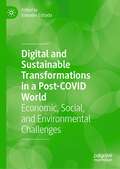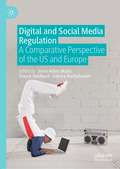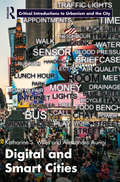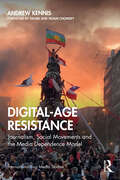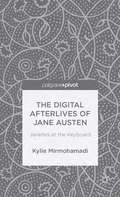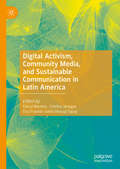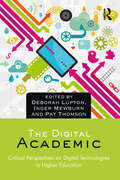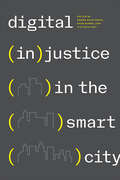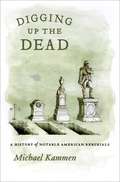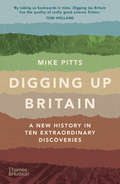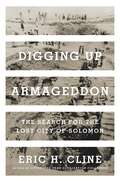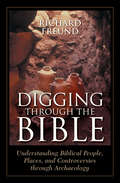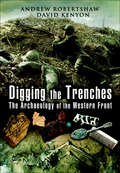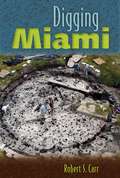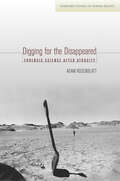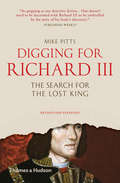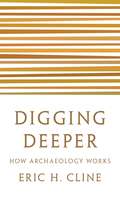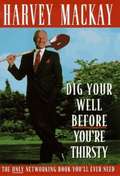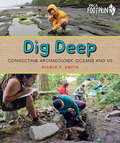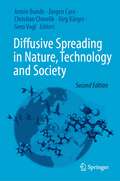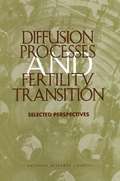- Table View
- List View
Digital and Sustainable Transformations in a Post-COVID World: Economic, Social, and Environmental Challenges
by Salvador EstradaCurrent social, economic, and environmental challenges presented by the United Nations’ Sustainable Development Goals may be partially attained by digitalization and sustainable practices diffusion. The antecedents, occurrences, and consequences of this process are currently under investigation, but the big challenge is to get a systemic view. This book attempts to bring such a view into focus.Digital and Sustainable Transformations in a Post-COVID World is dedicated to studying the consequences of the global crisis caused by the COVID-19 pandemic and the new needs and practices inherent in developing and disseminating digital and clean technologies.
Digital and Social Media Regulation: A Comparative Perspective of the US and Europe
by Sorin Adam Matei Franck Rebillard Fabrice RochelandetDigital and social media companies such as Apple, Google, and Facebook grip the globe with market, civic, and political strength akin to large, sovereign states. Yet, these corporations are private entities. How should states and communities protect the individual rights of their citizens – or their national and local interests – while keeping pace with globalized digital companies? This scholarly compendium examines regulatory solutions which encourage content diversity and protect fundamental rights. The volume compares European and US regulatory approaches, including closer focus on topics such as privacy, copyright, and freedom of expression. Further, we propose pedagogical models for educating students on possible regulatory regimes of the future. Our final chapter invites readers to consider social and digital media regulation for both this generation and the ones to come.
Digital and Smart Cities (Routledge Critical Introductions to Urbanism and the City)
by Katharine S. Willis Alessandro AurigiDigital and Smart Cities presents an overview of how technologies shape our cities. There is a growing awareness in the fields of design and architecture of the need to address the way that technology affects the urban condition. This book aims to give an informative and definitive overview of the topic of digital and smart cities. It explores the topic from a range of different perspectives, both theoretical and historical, and through a range of case studies of digital cities around the world. The approach taken by the authors is to view the city as a socially constructed set of activities, practices and organisations. This enables the discussion to open up a more holistic and citizen- centred understanding of how technology shapes urban change through the way it is imagined, used, implemented and developed in a societal context. By drawing together a range of currently quite disparate discussions, the aim is to enable the reader to take their own critical position within the topic. The book starts out with definitions and sets out the various interpretations and aspects of what constitutes and defines digital cities. The text then investigates and considers the range of factors that shape the characteristics of digital cities and draws together different disciplinary perspectives into a coherent discussion. The consideration of the different dimensions of the digital city is backed up with a series of relevant case studies of global city contexts in order to frame the discussion with real world examples.
The Digital and Its Discontents (Electronic Mediations #62)
by Aden Evens Alexander R. GallowayA groundbreaking critique of the digital world that analyzes its universal technological foundations Whence that nagging sense that something in the digital is amiss—that, as wonderful as our devices are, time spent on smartphones and computers leaves us sour, enervated, alienated? The Digital and Its Discontents uniquely explains that worry and points us toward a more satisfying relationship between our digital lives and our nondigital selves, one that requires a radical change in the way we incorporate technology into our lives. Aden Evens analyzes universal technological principles—in particular, the binary logic—to show that they encourage certain ways of thinking while making others more challenging or impossible. What is out of reach for any digital machine is contingency, the ontological principle that refuses every rule. As humans engage ourselves and our world ever more through digital machines, we are losing touch with contingency and so banishing from our lives the accidental and unexpected that fuel our most creative and novel possibilities for living. Taking cues from philosophy rather than cultural or media theory, Evens argues that the consequences of this erosion of contingency are significant yet often overlooked because the same values that make the digital seem so desirable also make contingency seem unimportant—without contingency the digital is confined to what has already been thought, and yet the digital&’s ubiquity has allowed it to disguise this inherent sterility. Responsive only to desires that meet the demands of its narrow logic, the digital requires its users to practice those same ideological dictates, instituting a hegemony of thought and value sustained by the pervasive presence of digital mechanisms. Interweaving technical and philosophical concepts, The Digital and Its Discontents advances a powerful and urgent argument about the digital and its impact on our lives. Retail e-book files for this title are screen-reader friendly.
Digital-Age Resistance: Journalism, Social Movements and the Media Dependence Model (Internationalizing Media Studies)
by Andrew KennisIn this trailblazing book, social movements, the mainstream news media and public policy are tackled in order to arm readers with an "intellectual self-defense" of the reign of trillion-dollar-valued platform conglomerates, reality TV presidencies of the past and present, the pandemic and the Biden administration. Firmly situated at the intersection of journalism, activism and the deployment of power, the author places his analysis within an international context that further develops a critical paradigm, called the media dependence model (MDM). Featuring a foreword by Daniel and Noam Chomsky and a preface by Robert W. McChesney, the book offers a cutting-edge overview of the news media landscape both within the United States and globally. The MDM critically analyzes dichotomous patterns of mainstream press coverage of the #ClimateStrike, #FamiliesBelongTogether, #EvasionMasiva (Chile), #FightForHongKong, #RickyRenuncia (Puerto Rico) and #CancelRent movements and the pro-Trump #liberate resistance, contrasting them with social media and other historic movements. "Evergreen" topics such as immigration, climate change and net neutrality are explored in depth, along with media reforms and concrete policy solutions. The book straddles disciplines including media, policy and journalism studies, political economy and international and political communication. It is a must-read for scholars, students, policy advisers, media makers, social media enthusiasts, grassroots activists, NGOs and concerned citizens alike.
The Digital Afterlives of Jane Austen: Janeites at the Keyboard
by Kylie MirmohamadiThis is the first scholarly study to explore the ever-expanding world of online Austen fandom and fan fiction writing. Using case studies from the Internet writing community and publisher, Wattpad, as well as dedicated fan websites, it illuminates the literary processes and products that have given Austen multiple afterlives in the digital arena.
Digital Activism, Community Media, and Sustainable Communication in Latin America
by Cristina Venegas Cheryl Martens Etsa Franklin Salvio Sharupi TapuyThis book brings together academic and activist work on community media, feminist, decolonial, and Indigenous perspectives to digital activism, including Free and Open Communication in Latin America. The essays in this collection speak to major changes over the past decade that are reshaping digital media uses and practices. The case studies presented here question many commonly held assumptions around global media ownership, sustainability, and access relevant to countries beyond Latin American contexts.
The Digital Academic: Critical Perspectives on Digital Technologies in Higher Education
by Deborah Lupton Pat Thomson Inger MewburnAcademic work, like many other professional occupations, has increasingly become digitised. This book brings together leading scholars who examine the impacts, possibilities, politics and drawbacks of working in the contemporary university, using digital technologies. Contributors take a critical perspective in identifying the implications of digitisation for the future of higher education, academic publishing protocols and platforms and academic employment conditions, the ways in which academics engage in their everyday work and as public scholars and relationships with students and other academics. The book includes accounts of using digital media and technologies as part of academic practice across teaching, research administration and scholarship endeavours, as well as theoretical perspectives. The contributors span the spectrum of early to established career academics and are based in education, research administration, sociology, digital humanities, media and communication.
Digital (Technoscience and Society)
by Debra Mackinnon Ryan Burns Victoria FastIn the contemporary moment, smart cities have become the dominant paradigm for urban planning and administration, which involves weaving the urban fabric with digital technologies. Recently, however, the promises of smart cities have been gradually supplanted by recognition of their inherent inequalities, and scholars are increasingly working to envision alternative smart cities. Informed by these pressing challenges, Digital (In)Justice in the Smart City foregrounds discussions of how we should think of and work towards urban digital justice in the smart city. It provides a deep exploration of the sources of injustice that percolate throughout a range of sociotechnical assemblages, and it questions whether working towards more just, sustainable, liveable, and egalitarian cities requires that we look beyond the limitations of "smartness" altogether. The book grapples with how geographies impact smart city visions and roll-outs, on the one hand, and how (unjust) geographies are produced in smart pursuits, on the other. Ultimately, Digital (In)Justice in the Smart City envisions alternative cities – smart or merely digital – and outlines the sorts of roles that the commons, utopia, and the law might take on in our conceptions and realizations of better cities.
Digging Up the Dead: A History of Notable American Reburials
by Michael G. KammenA funeral closes a life story, and a grave in a cemetery marks its end forever. But what happens when those left behind don't agree about the meaning of that story? Or when that disagreement extends all the way to arguments about the final resting place itself? In a surprising number of cases over the years, that's when people have chosen to grab shovels and start digging. With Digging Up the Dead, Pulitzer Prize-winning historian Michael Kammen reveals a treasure trove of fascinating, surprising, and sometimes gruesome stories of exhumation and reburial from throughout American history. Taking us to the contested grave sites of such figures as Sitting Bull, John Paul Jones, Frank Lloyd Wright, Daniel Boone, Jefferson Davis, and even Abraham Lincoln, Kammen explores how complicated interactions of regional pride, shifting reputations, and evolving burial practices led to public, often emotional battles over the final resting places of famous figures. Grave-robbing, skull-fondling, cases of mistaken identity, and the financial lures of cemetery tourism all come into play as Kammen delves deeply into this little-known- yet surprisingly persistent- aspect of American history. Simultaneously insightful and interesting, masterly and macabre, Digging Up the Dead reminds us that the stories of American history don't always end when the key players pass on. Rather, the battle- over reputations, interpretations, and, last but far from least, possession of the remains themselves- is often just beginning.
Digging Up Britain: Ten Discoveries, A Million Years Of History
by Mike PittsAn award-winning archaeologist and journalist chronicles England’s history—as told through the country’s recent archaeological discoveries. Digging Up Britain traces the history of Britain through key discoveries and excavations. With British archaeologist Mike Pitts as a guide, this book covers the most exciting excavations of the past ten years, gathers firsthand stories from the people who dug up the remains, and follows the latest revelations as one twist leads to another. Britain, a historically crowded place, has been the site of an unprecedented number of discoveries—almost everywhere the ground is broken, archaeologists find evidence that people have been there before. These discoveries illuminate Britain’s ever-shifting history that we now know includes an increasingly diverse array of cultures and customs. Each chapter of the book tells the story of a single excavation or discovery. Some are major digs, conducted by large teams over years, and others are chance finds, leading to revelations out of proportion to the scale of the original project. Every chapter holds extraordinary tales of planning, teamwork, luck, and cutting-edge archaeological science that produces surprising insights into how people lived a thousand to a million years ago.
Digging Up Armageddon: The Search for the Lost City of Solomon
by Eric H. ClineA vivid portrait of the early years of biblical archaeology from the acclaimed author of 1177 B.C.: The Year Civilization CollapsedIn 1925, James Henry Breasted, famed Egyptologist and director of the Oriental Institute at the University of Chicago, sent a team of archaeologists to the Holy Land to excavate the ancient site of Megiddo—Armageddon in the New Testament—which the Bible says was fortified by King Solomon. Their excavations made headlines around the world and shed light on one of the most legendary cities of biblical times, yet little has been written about what happened behind the scenes. Digging Up Armageddon brings to life one of the most important archaeological expeditions ever undertaken, describing the site and what was found there, including discoveries of gold and ivory, and providing an up-close look at the internal workings of a dig in the early years of biblical archaeology.The Chicago team left behind a trove of writings and correspondence spanning more than three decades, from letters and cablegrams to cards, notes, and diaries. Eric Cline draws on these materials to paint a compelling portrait of a bygone age of archaeology. He masterfully sets the expedition against the backdrop of the Great Depression in America and the growing troubles and tensions in British Mandate Palestine. He gives readers an insider's perspective on the debates over what was uncovered at Megiddo, the infighting that roiled the expedition, and the stunning discoveries that transformed our understanding of the ancient world.Digging Up Armageddon is the enthralling story of an archaeological site in the interwar years and its remarkable place at the crossroads of history.
Digging Through the Bible: Understanding Biblical People, Places, and Controversies through Archaeology
by Richard A FreundMany of our religious beliefs are based on faith alone, but archaeology gives the opportunity to find evidence about what really happened in the distant past-evidence that can have a dramatic impact on what and how we believe. Join celebrated archaeologist and rabbi Richard Fruend as he takes readers through digs he has led in the Holy Land, searching for evidence about key biblical characters and events. Digging Through the Bible presents overviews of the evidence surrounding figures such as Moses, Kings David and Solomon, and Mary the mother of Jesus, as well as new information that can help us more fully understand the life and times in which these people would have lived. Freund also presents new evidence about finding the grave of the Teacher of Righteousness mentioned in the Dead Sea Scrolls, and gives a compelling argument about how the Exodus of the Israelites may have taken place in three separate waves over time, rather than in a single event as presented in the Bible. In addition to discussin
Digging the Trenches: The Archaeology of the Western Front
by Andrew Robertshaw David KenyonThis comprehensive, illustrated survey of the latest in battlefield archaeology reveals &“intimate insight into the realities of life&” during WWI (Current Archaeology).Modern methods of archaeological, historical, and forensic research have transformed our understanding of the Great War. In Digging the Trenches, battlefield archaeologists Andrew Robertshaw and David Kenyon introduce the reader to this exciting new field and explore many of the remarkable projects that have been undertaken.Robertshaw and Kenyon show how archaeology can be used to reveal the positions of trenches, dugouts and other battlefield features, as well as what life on the Western Front was really like. They also show how individual soldiers are coming into focus as forensic investigation is so highly developed that individuals can be identified and their fates discovered.&“An excellent introduction to the subject…Digging the Trenches is essential reading.&”—Gary Sheffield, Military Illustrated&“What a splendid book this is.&”—Neil Faulkner, Current Archaeology
Digging Miami
by Robert S CarrThe pace of change of Miami since its incorporation in 1896 is staggering. The seaside land that once was home to several thousand Tequesta is now congested with roads and millions of people while skyscrapers and artificial lights dominate the landscape.Ironically, Miami's development both continually erases monuments and traces of indigenous people and historic pioneers yet also leads to the discovery of archaeological treasures that have lain undiscovered for centuries. In Digging Miami, Robert Carr traces the rich 11,000-year human heritage of the Miami area from the time of its first inhabitants through the arrival of European settlers and up to the early twentieth century.Carr was Dade County's first archaeologist, later historic preservation director, and held the position at a time when redevelopment efforts unearthed dozens of impressive archaeological sites, including the Cutler Site, discovered in 1985, and the controversial Miami Circle, found in 1998. Digging Miami presents a unique anatomy of this fascinating city, dispelling the myth that its history is merely a century old.This comprehensive synthesis of South Florida's archaeological record will astonish readers with the depth of information available throughout an area barely above sea level. Likewise, many will be surprised to learn that modern builders, before beginning construction, must first look for signs of ancient peoples' lives, and this search has led to the discovery of over one hundred sites within the county in recent years. In the end, we are left with the realization that Miami is more than the dream of entrepreneurs to create a tourist mecca built on top of dredged rock and sand; it is a fascinating, vibrant spot that has drawn humans to its shores for unimaginable years.
Digging in the City of Brotherly Love: Stories from Philadelphia Archaeology
by Rebecca YaminHistoric Philadelphia has long yielded archaeological treasures from its past. Excavations required by the National Historic Preservation Act have recovered pottery shards, pots, plates, coins, bones, and other artifacts relating to early life in the city. This updated edition of Digging in the City of Brotherly Love continues to use archaeology to learn about and understand people from the past. Rebecca Yamin adds three new chapters that showcase several major discoveries from recent finds including unmarked early eighteenth-century burial grounds, one of which associated with the first African Methodist Episcopal (AME) Church, in the oldest part of the city; a nineteenth-century working-class neighborhood built along the path of what is now Route I-95 and was once home to Native American life; and the remains of two taverns found on the site of the current Museum of the American Revolution. Yamin describes the research and state-of-the-art techniques used to study these exciting discoveries. In chronicling the value of looking into a city’s past, Digging in the City of Brotherly Love brings to life the people who lived in the early city and the people in the present who study them.
Digging for the Disappeared: Forensic Science after Atrocity
by Adam RosenblattThe mass graves from our long human history of genocide, massacres, and violent conflict form an underground map of atrocity that stretches across the planet's surface. In the past few decades, due to rapidly developing technologies and a powerful global human rights movement, the scientific study of those graves has become a standard facet of post-conflict international assistance. Digging for the Disappeared provides readers with a window into this growing but little-understood form of human rights work, including the dangers and sometimes unexpected complications that arise as evidence is gathered and the dead are named. Adam Rosenblatt examines the ethical, political, and historical foundations of the rapidly growing field of forensic investigation, from the graves of the "disappeared" in Latin America to genocides in Rwanda and the former Yugoslavia to post-Saddam Hussein Iraq. In the process, he illustrates how forensic teams strive to balance the needs of war crimes tribunals, transitional governments, and the families of the missing in post-conflict nations. Digging for the Disappeared draws on interviews with key players in the field to present a new way to analyze and value the work forensic experts do at mass graves, shifting the discussion from an exclusive focus on the rights of the living to a rigorous analysis of the care of the dead. Rosenblatt tackles these heady, hard topics in order to extend human rights scholarship into the realm of the dead and the limited but powerful forms of repair available for victims of atrocity.
Digging for Richard III: The Search for the Lost King (Revised and Expanded)
by Mike Pitts"As gripping as any detective fiction. Proof that one doesn't need to be fascinated with Richard III to be enthralled by the story of his body's discovery." —Publisher's Weekly In August 2012 a search began, and on February 4, 2013, a team from Leicester University delivered its verdict to a mesmerized press room and to the world: they had found the remains of Richard III, whose legacy was perhaps the most contested of all British monarchs. Prior to this major discovery, there had been little new information about Richard III for some time. With no new evidence to fuel it, the debate over what kind of man he might have been seemed to have stalled. Thus the story of the discovery of Richard III is a story of the value of archaeology—careful analysis of physical evidence backed up by the latest science and technology—and how it can change our understanding of history. Firsthand accounts from the team that found the king, along with photographs from the author’s own archives and an expanded epilogue incorporating new DNA evidence, augment this compelling detective story as the evidence is uncovered.
Digging Deeper: How Archaeology Works
by Eric H. ClineFrom the bestselling author of 1177 B.C., an accessible primer to the archaeologist's craftAn archaeologist with more than thirty seasons of excavation experience, Eric H. Cline has conducted fieldwork around the world, from Greece and Crete to Egypt, Israel, and Jordan. In Digging Deeper, Cline answers the questions archaeologists are most frequently asked, such as: How do you know where to dig? How are excavations actually done? How do you know how old something is? Who gets to keep what is found? How do you know what people from the past ate, wore, and looked like? Adapted from Cline's acclaimed book Three Stones Make a Wall, this lively little volume is brimming with insights and practical advice about how archaeology really works. Whether you are an armchair archaeologist or embarking on your first excavation, Digging Deeper is an essential primer on the art of the dig.
Digesting Race, Class, and Gender
by Ivy KenHow are the ways that race organizes our lives related to the ways gender and class organize our lives? How might these organizing mechanisms conflict or work together? In Digesting Race, Class, and Gender, Ivy Ken likens race, class, and gender to foods - foods that are produced in fields, mixed together in bowls, and digested in our social and institutional bodies. In the field, one food may contaminate another through cross-pollination. In the mixing bowl, each food s original molecular structure changes in the presence of others. And within a meal, the presence of one food may impede or facilitate the digestion of another. At each of these sites, the "foods" of race, class, and gender are involved in dynamic relationships with each other that have implications for the shape - or the taste - of our social order.
Digesting Difference: Migrant Incorporation and Mutual Belonging in Europe (Global Diversities)
by Kelly McKowen John BornemanMigration across Europe's external and internal borders has introduced unprecedented sociocultural diversity, and with it, new questions about belonging, identity, and the incorporation of others into extant and emergent groups and communities. Bringing together leading cultural anthropologists, Digesting Difference offers a series of ethnographic studies that show incorporation to be a process rooted in the everyday encounters and exchanges between strangers, friends, lovers, neighbors, parents, workers, and others. Rich in ethnographic detail and ambitious in its theorizing, the volume tells the stories of Europe’s transformative engagement with sociocultural difference in the wake of migration associated with EU expansion, the Eurozone meltdown, and the 2015-2016 refugee crisis. It promises to be essential reading for scholars and students of cultural anthropology, migration, integration, and European studies.
Dig Your Well Before You're Thirsty: The Only Networking Book You'll Ever Need
by Harvey MackayDig Your Well Before You're Thirsty contains Harvey's gold-chip advice, accumulated over a lifetime of business success, on how to build and maintain the network you need. Harvey guarantees you'll never be more than a phone call away from a person in the position to help you get what you want--whether it's the job opportunity of a lifetime or a lifetime partner, the sales prospect of your dreams or the career advice you've only dreamed of. Harvey shows you how to create a network of trusted, valuable contacts that is worth its weight in platinum.
Dig Deep: Connecting Archaeology, Oceans and Us (Orca Footprints #25)
by Nicole F. SmithWhat can archaeology and Indigenous Traditional Knowledge tell us about how our marine environments have changed over time and the effects of climate change? From harvesting herring eggs to hunting humpback whales, humans have had a relationship with the world's oceans for more than 100,000 years. In Dig Deep: Connecting Archaeology, Oceans and Us, young readers unearth what our ancestors left behind at archaeological sites around the world and examine how tools, campsites, fishing technologies and even garbage can show us how our ancestors lived and how they used the ocean. These discoveries can unearth clues to help keep our oceans healthier today and in the future.
Diffusive Spreading in Nature, Technology and Society
by Armin Bunde Jürgen Caro Christian Chmelik Jörg Kärger Gero VoglWhat do the movements of molecules and the migration of humans have in common? How does the functionality of our brain tissue resemble the flow of traffic in New York City? How can understanding the spread of ideas, rumors, and languages help us tackle the spread a pandemic? This book provides an illuminating look into these seemingly disparate topics by exploring and expertly communicating the fundamental laws that govern the spreading and diffusion of objects. A collection of leading scientists in disciplines as diverse as epidemiology, linguistics, mathematics, and physics discuss various spreading phenomena relevant to their own fields, revealing astonishing similarities and correlations between the objects of study—be they people, particles, or pandemics.This updated and expanded second edition of an award-winning book introduces timely coverage of a subject with the greatest societal impact in recent memory—the global fight against COVID-19. Winner of the 2019 Literature Prize of the German Chemical Industry Fund, this book targets an interdisciplinary readership, featuring an introductory chapter that sets the stage for the topics discussed throughout. Each chapter provides ample opportunity to whet the appetite of those readers seeking a more in-depth treatment, making the book also useful as supplementary reading in appropriate courses dealing with complex systems, mass transfer, and network theory.
Diffusion Processes And Fertility Transition: Selected Perspectives
by Committee on PopulationThis volume is part of an effort to review what is known about the determinants of fertility transition in developing countries and to identify lessons that might lead to policies aimed at lowering fertility. It addresses the roles of diffusion processes, ideational change, social networks, and mass communications in changing behavior and values, especially as related to childbearing. A new body of empirical research is currently emerging from studies of social networks in Asia (Thailand, Taiwan, Korea), Latin America (Costa Rica), and Sub-Saharan Africa (Kenya, Malawi, Ghana). Given the potential significance of social interactions to the design of effective family planning programs in high-fertility settings, efforts to synthesize this emerging body of literature are clearly important.
